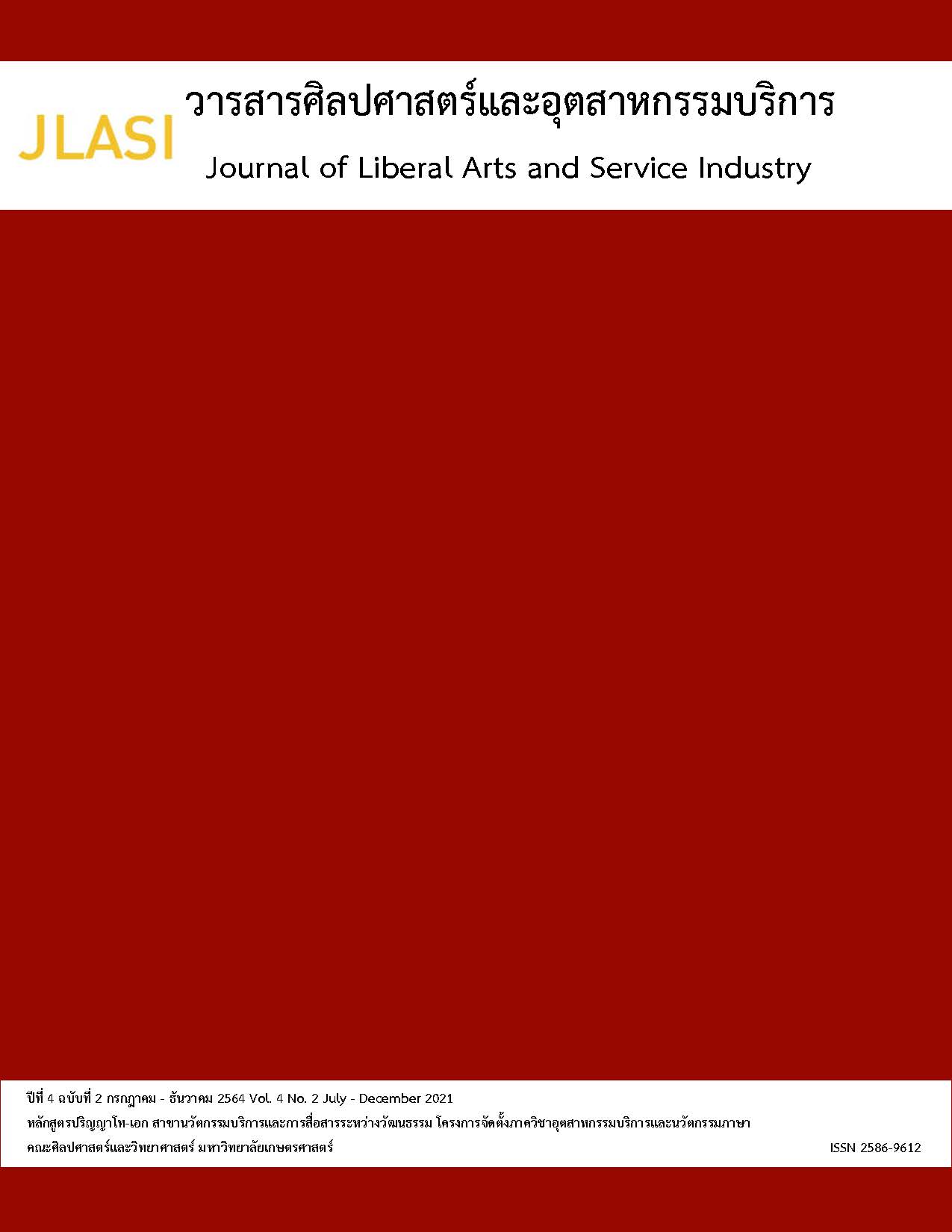ตราสินค้าแหล่งท่องเที่ยว และประสบการณ์การท่องเที่ยวที่ใช้ในการตัดสินใจเดินทางท่องเที่ยวเชิงศาสนาของนักท่องเที่ยวชาวไทย ในเขตกรุงเทพมหานคร
คำสำคัญ:
ตราสินค้าแหล่งท่องเที่ยว, ประสบการณ์การท่องเที่ยว, การท่องเที่ยวเชิงศาสนาบทคัดย่อ
การวิจัยนี้มีวัตถุประสงค์เพื่อ 1) ศึกษาตราสินค้าแหล่งท่องเที่ยวเชิงศาสนา 2) ศึกษาประสบการณ์การท่องเที่ยวเชิงศาสนา 3) เพื่อเปรียบเทียบลักษณะประชากรศาสตร์กับตราสินค้าแหล่งท่องเที่ยว และประสบการณ์การท่องเที่ยวที่ใช้ในการตัดสินใจเดินทางท่องเที่ยวเชิงศาสนาของนักท่องเที่ยวชาวไทย ในเขตกรุงเทพมหานคร การวิจัยนี้เป็นการวิจัยเชิงปริมาณ ใช้วิธีการเลือกตัวอย่างแบบสะดวก จากกลุ่มตัวอย่างนักท่องเที่ยวชาวไทยที่ตัดสินใจเดินทางท่องเที่ยวเชิงศาสนาในเขตกรุงเทพมหานคร จำนวน 400 คน ด้วยแบบสอบถาม การวิเคราะห์ข้อมูลใช้ค่าร้อยละ ค่าเฉลี่ย ค่าส่วนเบี่ยงเบนมาตรฐาน และทดสอบสมมติฐานด้วย t-test และ One-way ANOVA ผลการศึกษาพบว่า 1) ด้านตราสินค้าแหล่งท่องเที่ยว โดยรวมมีค่าเฉลี่ยอยู่ในระดับมาก ด้านข้อมูลต่าง ๆ ที่เชื่อมโยงกับตราสินค้าที่เป็นแหล่งท่องเที่ยว มีค่าเฉลี่ยมากที่สุด รองลงมาคือ ด้านความโดดเด่นของตราสินค้าที่เป็นแหล่งท่องเที่ยว 2) ด้านประสบการณ์การท่องเที่ยว โดยรวมมีค่าเฉลี่ยอยู่ในระดับมาก ด้านประสบการณ์นักท่องเที่ยวที่ใช้เหตุการณ์ งานประเพณี มีค่าเฉลี่ยมากที่สุด รองลงมาคือ ด้านประสบการณ์นักท่องเที่ยวที่เน้นเรื่องราว 3) การเปรียบเทียบลักษณะประชากรศาสตร์กับตราสินค้าแหล่งท่องเที่ยว พบว่า สถานภาพ ระดับการศึกษา และอาชีพ กับตราสินค้าแหล่งท่องเที่ยวในด้านภาพรวมที่ต่างกันมีการตัดสินใจในการเดินทางท่องเที่ยวเชิงศาสนา แตกต่างกันอย่างมีนัยสำคัญทางสถิติที่ระดับ 0.05 และ 0.01 และการเปรียบเทียบลักษณะประชากรศาสตร์กับประสบการณ์การท่องเที่ยวที พบว่า อายุ ระดับการศึกษา และรายได้เฉลี่ยต่อเดือน กับประสบการณ์การท่องเที่ยวที่ใช้ในการตัดสินใจเดินทางท่องเที่ยวเชิงศาสนา แตกต่างกันอย่างมีนัยสำคัญทางสถิติที่ระดับ 0.05 0.01 และ 0.001






